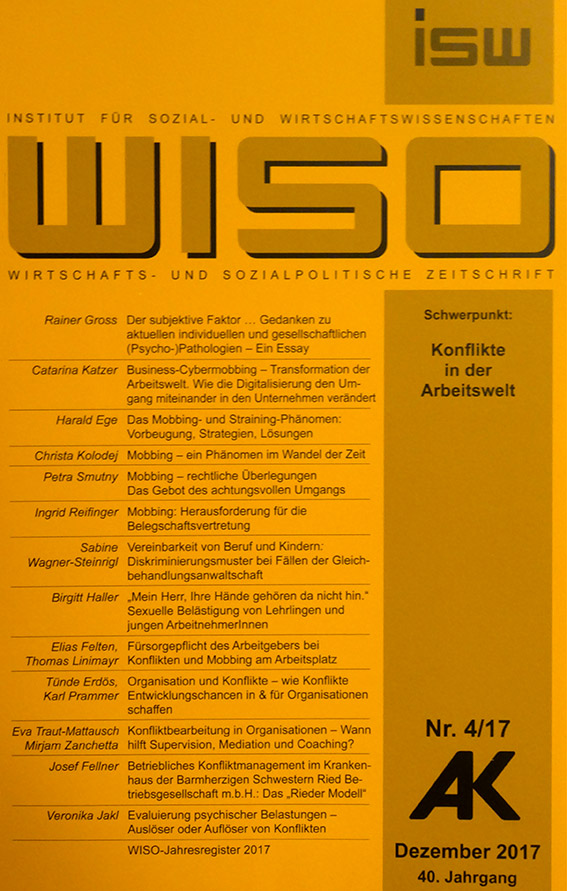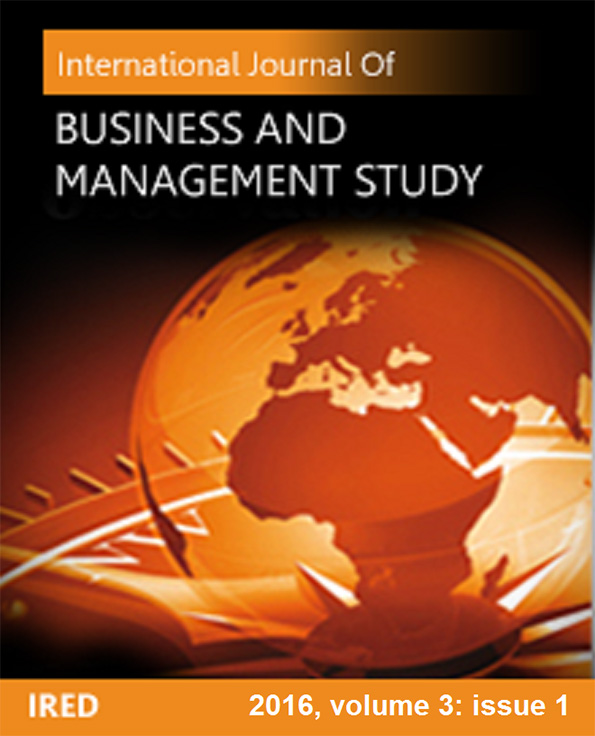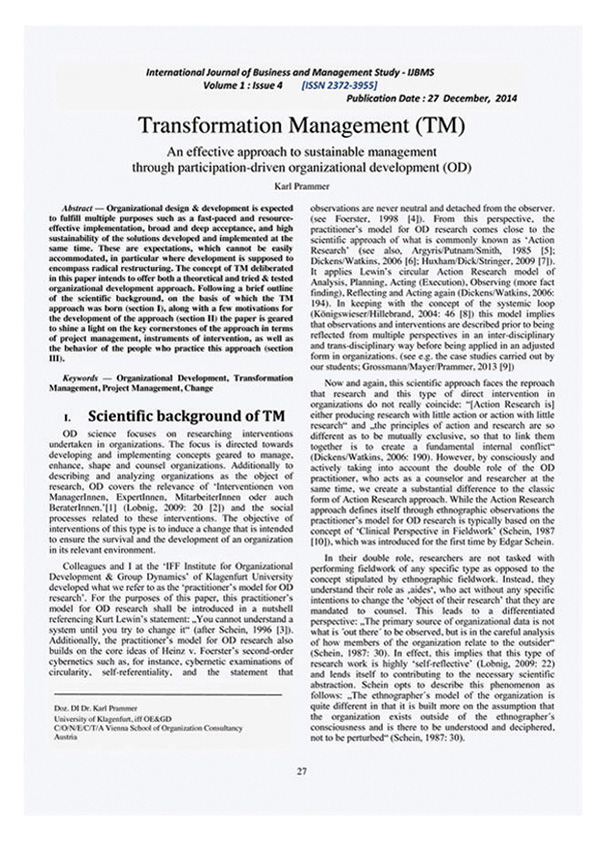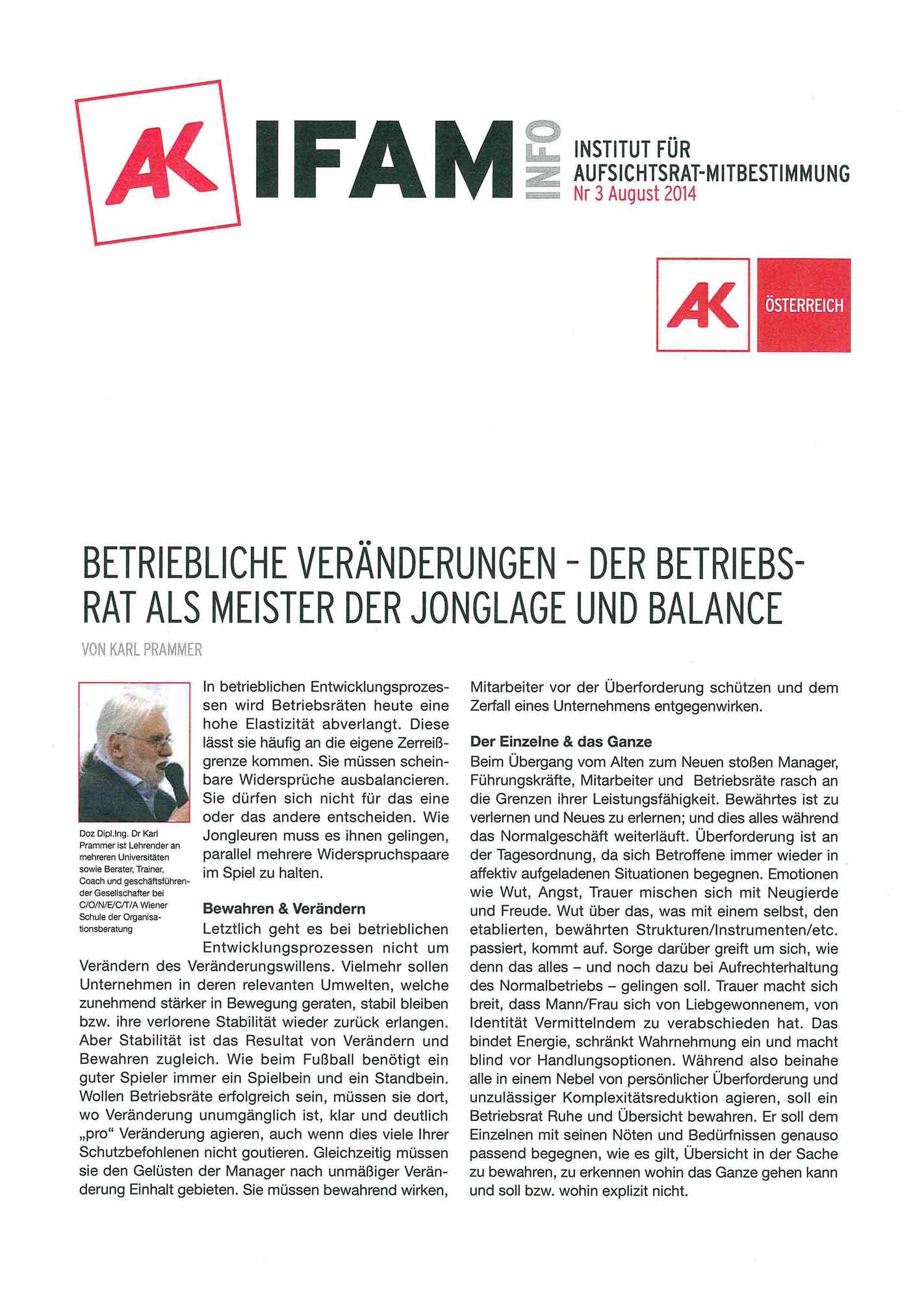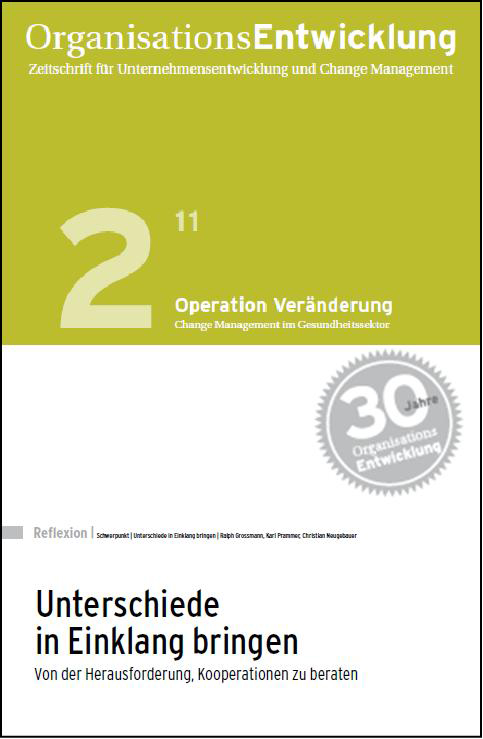Downloads
DOWNLOADS
ORGANISATIONEN UND KONFLIKTE
Abstract — Entwicklung und Lernen in und von Organisationen lebt von Unterschieden. Unterschieden wohnt aber häufig etwas Bedrohliches in sich. Ist die Bereitschaft zur Entwicklung gegeben, wird „Begegnung“ anstatt „Vergegnung“ (im Sinne Martin Bubers) angestrebt, weiß man über den relevanten Kontext, der wirkt, bzw. die „Marionettenfäden“, die in einer Organisation ziehen, Bescheid, dann haben Betroffene das Potenzial, Konflikte konstruktiv auszutragen und persönliche und organisationale Entwicklung auf inhaltlicher und sozialer Ebene zu schaffen.Nach einem Amuse-Gueule an Basics werden im Artikel anhand eines Fallbeispiels Möglichkeiten und Instrumente zur Konfliktlösung vorgestellt und Ratschläge mit „auf den Weg“ gegeben.
„Organizations and Conflict – How conflicts create potential of developement for and within organizations“
Abstract — This article constitutes that each and every learning step of persons and organizations is determined by differences. Conflicts develop out of difference and the striving to keep the status quo. The potential and possibilities of development can be seen in the making relevant differences conscious and visible. Utilizing a case study, the authors introduce instruments and strategies for conflict resolution.
Wirtschafts- und sozialpolitische Zeitschrift WISO; ISW, Linz, 40.Jg., 2017/4, S.167-202
SUSTAINABILITY IN ORGANIZATION DEVELOPMENT
Research Outcome and Current Practice
Artikel – Doz. Dipl.Ing. Dr. Karl Prammer, Mag. Tünde Erdós, MSc; Italien / Rom 2015
Abstract — Since the publishing of what has become to be known as the ‘Brundtland-Report’ in 1987 the term sustainability has been used in various ways. However, there is almost no relevant literature that would explicitly exhort the concept of sustainability in the context of Organization Development (OD) itself. The paper attempts to sketch sustainability in the organizational field as a contingent matter. In effect, in capturing potential aspects of sustainability that might be ‘in the room’ and in dialoguing about the relevance thereof for an OD endeavor we deem it to be primordial to give a voice to both the existing environments and those that might possibly arise in the future. Additionally, it proves essential to establish some sort of transition organization which is predestined to encompass all the sustainability aspects identified as relevant and to follow up on those aspects in a room free from taboos in what we refer to as a cyclical, recursive and reflexive process. Such an approach is likely to allow for sustainable solutions to emerge with impunity. Finally and complementing the two ideas above, on a personal and social level, it seems imperative to accompany parties concerned from leadership, to management, to shopfloor such that they feel facilitated to embark on a joint Organization Development journey cognitively and emotionally with the aim to develop sustainable and fully engaged realities in their organization.
Italien / Rom 2015
TRANSFORMATION MANAGEMENT (TM)
An effective approach to substainable management through participation-driven organizational development (OD)
Artikel – International Conference of Advances in Economics, Management and Social Studies; Kuala Lumpur / Malaysia 2014
Abstract — Organizational design & development is expected to fulfill multiple purposes such as a fast-paced and resourceeffective implementation, broad and deep acceptance, and high sustainability of the solutions developed and implemented at the same time. These are expectations, which cannot be easily accommodated, in particular where development is supposed to encompass radical restructuring. The concept of TM deliberated in this paper intends to offer both a theoretical and tried & tested organizational development approach. Following a brief outline of the scientific background, on the basis of which the TM approach was born (section I), along with a few motivations for the development of the approach (section II) the paper is geared to shine a light on the key cornerstones of the approach in terms of project management, instruments of intervention, as well as the behavior of the people who practice this approach (section III).
DOI: 10.15224/978-1-63248-054-5-72
In: EMS 2014, Proceeding of International Conference of Advances in Economics, Management and Social Studies; Kuala Lumpur / Malaysia 2014, P.22-28, ISBN: 978-1-63248-054-5
In: International Journal of Business and Management Study – IJBMS, Volume 1 : Issue 4, 2014, P. 27-33
BETRIEBLICHE VERÄNDERUNGEN
Der Betriebsrat as meister der Jonglage und Balance
Artikel – Doz. Dipl.Ing. Dr. Karl Prammer, 2014
Abstract — In betrieblichen Entwicklungsprozessen wird Betriebsräten heute eine hohe Elastizität abverlangt. Diese lässt sie häufig an die eigene Zerreißgrenze kommen. Sie müssen scheinbare Widersprüche ausbalancieren. Wie Jongleuren muss es ihnen gelingen, parallel mehrere Widerspruchspaare im Spiel zu halten. Zum Beispiel: Bewahren & Verändern, der Einzelne & das Ganze, Unternehmen & Gewerkschaftsbewegung.
Im Kurzartikel versucht Karl Prammer aber nicht nur solche typischen Widerspruchsfelder zu beleuchten. Er setzt diesen auch lösungsorientierte Aussagen entgegen. Beispielsweise:
Dem Management vor Augen führen, dass der Erfolg eines Gestaltungsprozesses nicht nur eine Funktion der inhaltlichen Qualität der gefundenen Lösungen ist sondern auch der Akzeptanz, welche diesen Lösungen und dem Prozess ihrer Entstehung entgegengebracht.
Je mehr Manager, Führungskräfte, Change Agents und Berater nur „das Neue“ im Auge haben und promoten, umso mehr müssen andere dem „Alten“ Sprache geben. Oder umgekehrt: Wenn diese das, was MitarbeiterInnen und Betriebsräte für bedeutsam erachten, ebenso beachten, würdigen, dann können MitarbeiterInnen und Betriebsräte auch auf das fokussieren, was Managern und Führungskräften fürs Überleben in der Zukunft bedeutsam erscheint.
AK Österreich – AK IFAM Institut für Ausfsichtsrat-Mitbestimmung Nr. 3 August 2014
UNTERSCHIEDE IN EINKLANG BRINGEN
Von der Herausforderung, Kooperationen zu beraten
Artikel – ZOE Organisationsentwicklung, Zeitschrift für Unternehmensentwicklung und Change Management. Ralph Grossmann / Karl Prammer / Christian Neugebauer, Handelsblatt Fachmedien / Düsseldorf, 2011/2
«Führen Sie über 30 staatliche, ausgegliederte staatsnahe und zivilgesellschaftliche Organisationen des Gesundheits- und Sozialbereichs in ein Kooperationssystem zusammen. Beraten Sie dabei die beteiligten Akteure (letztlich waren es 164 Personen, die in unterschiedlichen Projektgremien aktiv mitwirkten) beim Aufbau einer raschen, lückenlosen sowie medizinisch und ökonomisch sinnvollen Behandlungskette für alle PatientInnen bzw. unmittelbar Betroffenen. Und entwickeln Sie eine gemeinsame Kooperationsstruktur, um die Ergebnisse dieses Veränderungsprozesses nachhaltig abzusichern.»
Anhand dieser Fallstudie arbeiten wir einige zentrale Fragen und Herausforderungen heraus, denen sich BeraterInnen und Beteiligte beim Aufbau einer trans- und interdiziplinären Kooperation stellen sollten.
In: ZOE Zeitschrift für Organisationsentwicklung und Change Management , 2011/2, S.20-29

